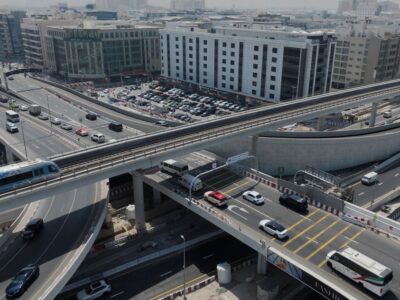Scepticism towards change has always surrounded milestone innovations. A few decades ago the arrival of the internet had its share of critics who considered this “new technology” as impossible. But today, we are about to enter the Web3 era built on principles that will enable greater web access and control for people.
The invention of the automobile over 130 years ago has been a game-changer for multiple generations. But in its early days, car builders came up against sceptics who reasoned that it was preferable to continue using horse-drawn carriages.
Since the steam engine, no mode of transportation has had a globally significant and inclusive impact as large as cars have. It is recognised that democratising access to a car can create numerous opportunities for entire communities. In the US alone, research shows that owning a car has been among the most powerful economic advantages a family can have over the past 50 years. However, in the MENA region, the lack of financial inclusion has limited people’s ability to access cars.
But despite having been around for over a century, cars really haven’t changed much. Recent advances like self-driving cars, electric engines and numerous other technologies are still in their infancy. While there is no doubt that these technologies will transform every driver’s experience, innovators are going to first come up against the adoption barrier.
Early stage technologies are known to be prohibitively expensive – and in many cases not fail-proof. Unless you’re a keen adopter of new trends, it is human tendency to wait for mass acceptance before buying into a new technology yourself. One factor we are certain of though, is that there’s going to be no stopping the automotive revolution.
Why is this important in the GCC? The region has for long been an auto enthusiast’s paradise, with major brands having a strong presence here. With new technology ingrained in cars and the demand for climate friendly innovations, the vehicles we drive are changing. In fact, Saudi Arabia’s Public Investment Fund (PIF) is playing a major role in the development of Lucid Motors, with plans to manufacture in the kingdom. As a beacon for electric mobility, Lucid Motors will elevate the region’s position as a capital for car enthusiasts.

So how can we encourage adoption of these game-changing technologies without burdening consumers? After all, even a Tesla Model 3 starts at AED174,990. If you’re a keen driver, you don’t want to limit yourself only to test drives or ordering an Uber just to sit in the back.
Financial inclusion remains the biggest deterrent to car access here in our region. MENAPT has one of the lowest global vehicle penetration rates (140 cars/1000 people). In comparison, Brazil and Russia have a vehicle penetration rate of 260 and 300 respectively. With only 18 percent of adults in MENAPT having a bank loan and 57 percent having a bank account, banks find it risky to fund depreciating assets when individuals don’t have a strong credit record.
With car subscription, automotive enthusiasts have an opportunity to access mobility on their terms, while having complete flexibility with no lock-ins. Combined with the region’s digital transformation ambitions, subscription’s tech-first approach to access automobiles prioritises customer preferences. We’ve seen the impact of app-based services for ride hailing and today this is at the heart of the car subscription model.

Globally, car subscriptions have also helped revive lagging sales and amidst the pandemic gave people a safe and socially distant way to travel from A to B. According to BCG, in 10 years, car subscriptions could become a $30 billion to $40 billion market. More interestingly, it is estimated that in Europe and the US, subscriptions could drive up to 15 percent of all new car sales. For the MENAPT region, the growth opportunity is very large as we will be building from a lower base motorisation rate.
For dealers, this also creates a new digital-first revenue stream, by monetising otherwise idle stock, while still remaining operationally lean. It’s no wonder that across industry stakeholders, subscription has fast become the go-to approach to get drivers behind the wheel.
While major manufacturers like Audi and Porsche already offer their own subscription services, in the MENAPT region subscription will enable car access and new economic opportunities. Subscriptions remove risk for manufacturers, drivers, dealers and even insurance companies. For an industry in transition, try and drive will accelerate the sector’s growth path once again allowing consumers to experience the best of tomorrow’s mobility advances.
As a technology first industry, car subscription platforms are also using data and AI in new ways every day. This technology helps price cars better, improves utilisation rates and conversions, makes recommendations and also models driver behaviour for risks.
We are at the start of a journey where I believe we will soon see cars with a Made in UAE or Made in Saudi Arabia badge hit our roads. The focus on clean mobility and self-driving cars is indicative of the commitment to the sector from the region’s leadership. Through all of this, it will be critical to build consumer trust which is paramount in today’s on-demand world.
As we stand at the cusp of an automotive revolution, the GCC is in the enviable position of being able to fast-track the future of the sector. The next time you want to drive or switch your car, you don’t need to walk into a showroom. You just need to tap a button on an app and wait for your car to be delivered.








